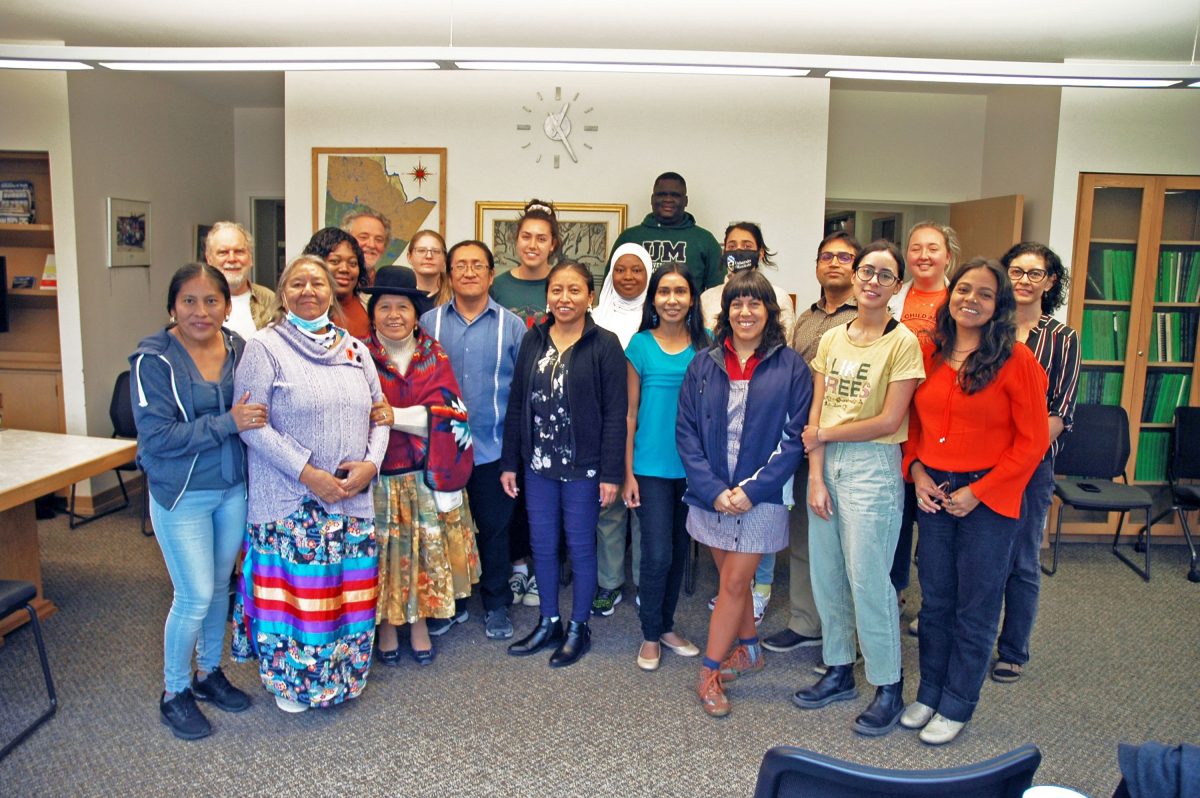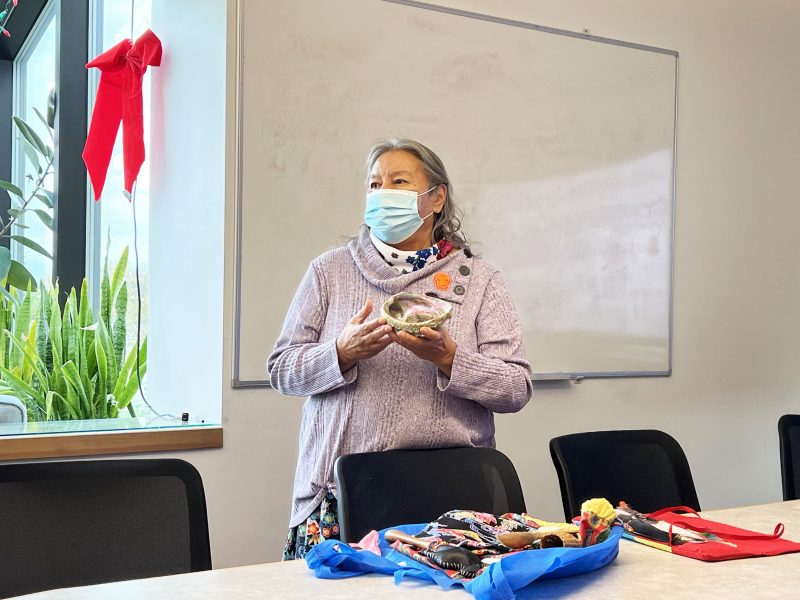
Participants of the Ărramăt project joined together with students for a conversation.
A conversation with Ărramăt Indigenous leaders and scholars on holistic healing and physical-spiritual relationships with Mother Nature
On Thursday September 28th, Ărramăt Pathway 9 facilitated a conversation about “Physical and Spiritual Relationships with Mother Nature in Indigenous holistic healing” at the Natural Resources Institute of the University of Manitoba. Dr. Iain Davidson-Hunt explained that Ărramăt is a team of Indigenous organizations, governments, university researchers, and other resource people working together in support of the health and well-being of the environment and Indigenous Peoples. Funded by the New Frontiers in Research Fund, Ărramăt is working to strengthen Indigenous voices and capacities to document their knowledge about the importance of the whole environment (including biodiversity) to the health and well-being of their communities. Along with Aymara leader and scholar from Bolivia, María Eugenia Choque Quispe, Dr. Davidson-Hunt is co-leading the Pathway 9 on “Strengthening physical and spiritual relations with Mother Nature”, one of 10 global transformation pathways reflecting priority areas for research, action, and policy change on biodiversity and Indigenous health and wellbeing.
During the conversation, Anishinaabe Elder and knowledge keeper Phyllis Pinesse explained that the waters of Shoal Lake have a holistic health meaning to Indigenous People in Treaty 3. She pointed out how this relation was interfered with by the construction of the dams and the aqueduct constructed in the early 1900s through which water flows to Winnipeg. These developments change water levels, and periodically reverse the flow of water, resulting in an increase in contamination. algae, and sedimentation patterns of what was once pristine water. She also explained that for their ceremonial practices they use water and copper, a mineral that Anishinaabe People used to trade with other First Nations for their healing properties.

Anishinaabe Elder and knowledge keeper Phyllis Pinesse sharing about her helpers that support holistic healing.
Mayan scholar Filiberto Penados shared that in Yucatan language people greet each other asking “how is your walking?”, a greeting that has a profound notion of relational wellbeing. He explained that this speaks for the importance of relationships with other beings. As he noted, Indigenous People have always had ways to relate to others, to sustain relationships and bring these into balance. Relationships with the land have been interrupted and there is a need of restoring them in an Indigenous way. He emphasizes that the healing is not only required within Indigenous communities but within humanity as a whole.
Ărramăt co-leader María Eugenia Choque Quispe shared her personal story about the discrimination she suffered when she entered university and how she “healed her spirit” through revaluing her identity. For her, practicing her language was important to reconstruct and disseminate the ancestral Aymara oral history. Furthermore, she understood that this cultural practice can only be reproduced through the restitution of their territorial rights and the ability of Indigenous Peoples to exercise their territorial autonomy in their Ayllus. In the land-based and Indigenous-led project that she is working on with the community of Corque Marca, Aymara People are recording their songs, myths, and legends as a way to heal their relationship with the territory.
For more information on the Ărramăt project see: https://arramatproject.org
Participants in the Conversation:
Phyllis Pinesse is a Natural Resource technician from Iskatewizaagegan Independent First Nation. She is a Knowledge Keeper, Grandmother and Mother. She is also a teacher of medicinal plants, and cultural values and vision.
Filiberto Penados, a Maya scholar from Belize is Associate Professor and Research Director at Galen University. His activist scholarly work focuses on Indigenous and critical education and development. He has a long history of working in and with Indigenous communities and organizations in Belize. Dr Penados chairs the Julian Cho Society and is a technical advisor to the Belize National Indigenous Council and Toledo Alcaldes Association.
María Eugenia Choque Quispe, Aymara woman from the Plurinational State of Boliva with Social Work Degree from the Universidad Mayor de San Andrés, La Paz, Boliva and Master’s in Andean History from the Latin American Faculty of Social Sciences (FLACSO), Quito, Ecuador. She has worked for the defense of Indigenous Rights, strengthening of Indigenous organizations with a focus on the participation of women in these processes. She contributed to the development of the American Declaration of Indigenous Peoples’ Rights and UNDRIP. She is also a previous member of the UN Permanent Forum on Indigenous Issues.






